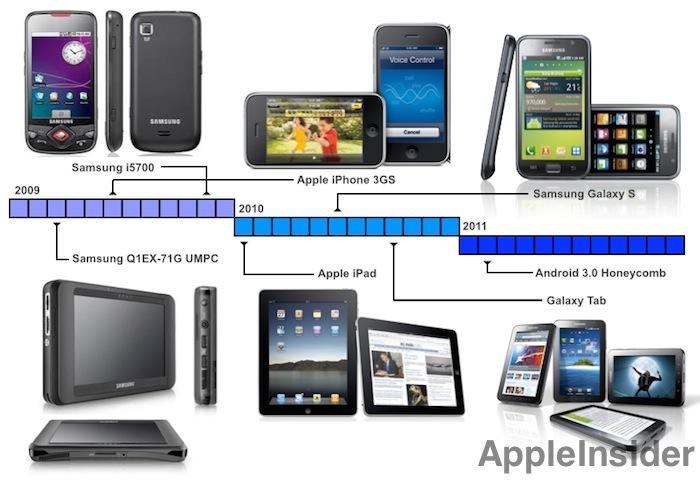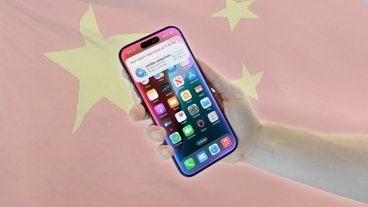After failing to do much more than embarrass Samsung Electronics in years-long legal battles over patent infringement, Apple has rapidly obliterated Samsung's mobile division profitability, rendering it as barrenly unprofitable as every other Android or Windows licensee with razor thin margins in the phone, PC and tablet market.
Samsung's collapse in profits caused by Apple, not Xiaomi
While Apple's critics might prefer to credit Xiaomi for Samsung's decline, the South Korean giant's plummeting profitability is not due to a major drop in its low priced, high volume phones and tablets but rather an implosion of Samsung's profitable, high end Galaxy S and Note models that directly compete with iPhones.
Earlier today, Samsung announced an incredible 73.9 percent drop in its mobile division profits for Q3. Analysts have been noting through 2014 that the company faces increasing competitive pressure from both Apple on the high end and from high volume sales of lower end models increasingly being produced by Chinese companies, in particular rising star Xiaomi.
Samsung is clearly facing a battle on both fronts. However, based on the numbers the company has reported, the catastrophic drop in profits Samsung suffered in the third quarter has come from a thermonuclear assault by Apple targeting its core revenue and profit generators. Further, the damage Apple caused Samsung will only get worse for the company as its remains are ravaged by other Android licensees.
Samsung documents the cause of its profit implosion
Samsung still hasn't paid Apple the nearly $1 billion judgement it was ordered to pay back in 2012 for patent infringement. However, it just reported a much larger $4.7 billion YoY drop in quarterly profits within its IT & Mobile Communications (IM) group— which is roughly comparable to Apple's operations. The cause of this sudden collapse in profits is not a mystery.
Samsung's profit collapse was not principally due to Chinese phones flooding the market. IDC just reported in its smartphone market estimates that Samsung still leads the world in shipments and market share by a large margin, having shipped 78.1 million units, a YoY decline of just 8.2 percent.
Samsung itself reported a sequential "slight growth in shipments" in its earnings release, but explained that "earnings declined QoQ as ASP decreased due to weak smartphone product mix and sales decrease put pressure on the cost structure."
In other words, profits were down because average selling prices were down, because it was selling less profitable phones and because it was becoming even more expensive to build its most expensive phones due to a reduction in economies of scale. Removing any remaining mystery, Samsung flat out stated that its phone shipments in the quarter were "driven by mid to low-end products."
That means Samsung missed out on high end sales. While IDC estimates that Samsung's total sales were down just 8.2 percent, analyst Ben Bajarin reported that Samsung's premium phones were down by nearly 50 percent in Q3.
In Q3 2014 Samsung's Galaxy S products + Note products saw nearly 50% decline in sales both QoQ and YoY according to my mix estimates.
— Ben Bajarin (@BenBajarin) October 30, 2014Given that premium phones have historically made up about a third of Samsung's total unit sales, that indicates that Samsung not only lost lots of high end sales, but also substituted profitable sales with unprofitable volume filler, resulting in a "weak smartphone product mix," exactly as the company admitted.
As a result, Samsung's mobile division reported just $1.66 billion in operating income, compared to Apple's earnings of $11.2 billion. Samsung's mobile division reported just $1.66 billion in operating income, compared to Apple's earnings of $11.2 billion.
Targeting Samsung's profit engines
A nuclear strike with the ability to devastatingly eviscerate such a valuable target— effectively bombing Samsung back into its Stone Age prior to its copying the iPhone— would require a very sophisticated warhead.
Producing a large screen phone with adequate 64-bit CPU and leading GPU processing power to drive it, and then giving it clearly differentiated features including Touch ID and Apple Pay as well as Continuity features that tie it into the Mac desktop, iPad and the upcoming Apple Watch, were all elements of a plan to strip Samsung of its Galaxy S and Note 4 profit engines.
Samsung has long been a high volume phone maker relative to Apple, but its profitability in mobiles began to surge immediately after the company embarked upon its 2010 strategy to duplicate Apple's iPhone as closely as possible with the Galaxy S. The company also attempted to replicated Apple's iPad business, but with far less commercial success.
While Samsung failed— along with other Android licensees— to ever earn big profits from tablets, the company did gain new success with its Galaxy Note hybrid "phablet," a product that introduced tablet-like features but sold as a smartphone in subsidized carrier contracts.
Unlike Apple's iPad, which sells for around two-thirds the price of an iPhone, Samsung positioned its Galaxy Note as a more expensive smartphone than even its Galaxy S flagship. Last year's Galaxy S4 had a retail price on par with Apple's iPhone 5s, but the larger screened Note 3 was priced $100 higher.
Samsung doesn't always get full retail price for its phones, frequently offering buy-one-get-one offers to drive volume sales. It has also bundled free tablets with phone sales. Both practices drive down the company's Average Selling Prices and its profits.
Even so, the profitability of its Galaxy S and Note models carried not only Samsung's other more basic phone sales, but also the entirety of its IT & Mobile group (which also makes tablets, computers and networking gear) and even made up the majority of the profits of Samsung Electronics— an enterprise that spans from appliances and TVs to video displays, memory chips and ARM processors. At the beginning of 2014, Samsung's premium phone sales were driving 70 percent of Samsung Electronics' total profits.
Strangely, while analysts regularly expressed concerns about Apple deriving more than half of its profits from iPhone, nobody in tech media blogs seemed concerned that most of Samsung Electronics' profits were coming from its version of the iPhone, or about what might happen if those revenues were to ever collapse.
IDC, Gartner and Strategy Analytics helped obscure Samsung's fate
Apple has long earned more money than Samsung while exclusively selling only higher end ($400+) iPhones. In fact, while Samsung was routinely reported to have shipped twice as many total phones as Apple (and still does, below), Apple was earning twice as much profit (it's now earning 6.7x as much).
Those profits allowed Apple to make massive investments in OS software, apps and custom silicon. In contrast, Samsung largely relied upon off the shelf software from Google and Application Processors from Qualcomm.
As a result, Samsung's product differentiation was increasingly based on building phones with large screens. As soon as rumors began hinting at larger iPhones, Samsung's sales of high end Galaxy S phones began to stagnate. Samsung doesn't detail in its quarterly reports how many premium phones it sells compared to its "carrier friendly, good enough" models, and market research firms didn't publicly detail the difference between premium phones and volume filler either.
Instead, firms like IDC have been blindly serving up smartphone market statistics focused entirely on shipment volumes and market share, regularly congratulating Samsung on its ability to ship huge volumes of devices. Now that Samsung's profits are collapsing, IDC is drawing attention to other companies that have the exact same focus, with no apparent recognition of cause and effect.
Xiaomi was hailed by Bloomberg in September when the emerging vendor's president Bin Lin stated in an interview that it had turned a profit for the first time, although the report noted that "he didn't supply a figure for profit." Instead, he focused on shipments and market share.
Lenovo and LG, both nearly tied with Xiaomi for third place in quarterly unit shipments, are also focused on shipments and market share. In its earnings report, Lenovo doesn't detail its profits by segment, but did note that overall, "gross margin decreased by 0.6 points year-on-year to 13 percent due to higher mix from consumer products." In other words, its focus on market share was pushing down its already slim margins. Apple's margins are closer to 40 percent.
LG reported that "profitability improved widely" in its mobile segment both sequentially and over the year-ago quarter. However, LG has been regularly losing money, so even after its improvement, its mobile margins are still at 3.9 percent. LG could double its profitability and quadruple its sales and it would still be earning less than the beleaguered Samsung.
Amazing convergence between Samsung's and LG's mobile margins in recent quarters (tho more driven by Samsung than LG) pic.twitter.com/LR4aCFu0Na
— Jan Dawson (@jandawson) October 30, 2014Essentially, every vendor apart from Apple in IDC's top five has the same strategy of being "focused on shipments and market share" rather than profitability, giving them the same trajectory as Samsung. IDC is applauding this just as it applauded Samsung right up to its profit implosion.
Meanwhile, IDC has gravely warned for years that Apple's market share continues to slip— in both smartphones and tablets— as it finds new ways to increase its Others category to insure the statistics keep telling this story of slipping market share.
However, Apple's profitability has continued to remain spectacularly high, even as shipment and market share leaders shifted from Motorola to Blackberry to Nokia to Samsung as their predecessors imploded in failure. Apple has made it explicitly clear that its goal is not market share, but profitability, something that's only achieved by building great products that people want to buy. Gunning for market share is much easier: just ship tons of cheap products, and if necessary, give them away.
In fact, by publishing misleading market estimate figures that obscured the real value of Samsung's shipment volumes, research firms incentivized Samsung to make poor business decisions.
Google helped seal Samsung's fate
Without any obvious way for Samsung to differentiate its Android products— an issue that Google and Samsung have been fighting over throughout the year— Samsung faces another big problem going forward.
Google is not only offering Samsung's competitors the same Android software, but it's blocking Samsung from making meaningful changes that would limit Google's market power over Android. That is increasingly forcing Samsung to investigate its alternatives, and none of them are very attractive. It could return to licensing Microsoft's mobile software, which would put it in the same position with a different master, or it could try to go solo with its own Tizen.
The problem there is that maintaining a unique platform is very expensive. Microsoft and Google have both financed their mobile platforms using their high profit margins on software and services related to the PC desktop. Samsung's profits come primarily from its mobile phones, but even those profits (before they collapsed) generated half the margins of Apple.
And as Amazon demonstrated this year with its Fire Phone flop, trying to create a new smartphone platform with meaningful differentiation— even when starting with working Android code— involves a lot of resources and tremendous risk.
Samsung is now back to square one; it's stuck partnering with Google the way HTC, LG, Lenovo, Xiaomi and others are, with a similarly hopeless outlook for ever being wildly profitable again. Essentially, Samsung's phone business is now in the same place as its tablet business, or the tablet business of every other Android licensee. It can spend lots of money trying to look different, but in the end Android is all about serving up ads for Google, not for enabling individual licenses to make money.
How can Samsung rebuild its profit engine?
After years of bloggers explaining how Apple's profitability would be eroded away by commodity Windows and then Android licensees makers, Vlad Savov, writing for the The Verge, sought to explain away Samsung's current problems by stating that all the company really needs to do is produce a "portfolio of better-designed phones."
Samsung isn't the first company to lose profitability and the find itself unable to get it back due to fierce competition. Blackberry, Nokia and HTC are all examples of companies that worked hard to win back customers with "better designed phones" but simply could not turn back the clock.
Further, while Samsung's problems were particularly bad in Q3, they appear set to only get worse in Q4, when Apple has historically enjoyed spectacular results. This year, most of Samsung's Note 4 launch was pushed into Q4, meaning it will have to directly compete against iPhone 6 and iPhone 6 Plus.
Going forward Samsung will lose its position as the default alternative to Apple; Xiaomi is already an even more shameless copy of Apple than even Samsung. And at the same time, Google is partnering with HTC, Asus, LG and Motorola to launch its latest Android 5.0 Lollipop on Nexus branded devices.
Without a dominant Samsung defining Android, Google may likely find itself dealing with more AOSP vendors (like Amazon) making use of Android without the obligation to follow Google's directions. That could lead to greater innovation and more experimentation. In any case, Android now faces a huge wildcard because its largest advertiser and most dominant licensee by far just experienced a major collapse in profits due directly to its use of Android.
Given Android's still unresolved intellectual property issues with Oracle, the company's abandonment of Motorola and the departure of Android's founder Andy Rubin, Google's overall strategy for its alternative to iOS may experience some of its biggest changes ever in 2015.
 Daniel Eran Dilger
Daniel Eran Dilger









-m.jpg)






 Charles Martin
Charles Martin
 Christine McKee
Christine McKee
 Wesley Hilliard
Wesley Hilliard
 Malcolm Owen
Malcolm Owen
 Andrew Orr
Andrew Orr
 William Gallagher
William Gallagher
 Sponsored Content
Sponsored Content








315 Comments
Geez now its a race to collect that 1 Billion before this company folds....
Samsung chose to enter the market by copying and competing based on price. Eventually, someone else offers a cheaper POS to steal the low-end of the market, which many Chinese companies now do.
Apple didn't build great products for its users. It did it to screw Samsung. Ummm yeah ok.
Sorry, Vlad, it's not the design. It's the software. I can't help but wonder if the recent poll ratings showing people trust the NSA more than Google might have something to do with this, people ditching Android in general (which naturally would affect Samsung the hardest) to move to iOS or WP8.
The real -- and fitting -- insult to Samsung will be it'll ultimately be killed off by a third-rate, bottom-feeding copyist like Xiaomi. It'll then be a matter of time before the pointlessness of it all sinks in and Google gives up on Android (Rubin's departure will speed this up). Soon thereafter, with little or no software support available, the bottom-feeders will be gone too. It'll all take a few years to play out, but that's where we're headed. (Add: Looks like SS posted something similar before I did!)